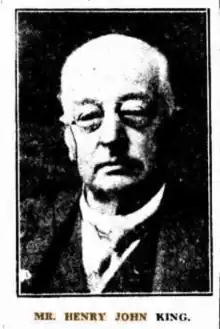Henry John King | |
|---|---|
 Henry John King 1933 | |
| Background information | |
| Born | 1 January 1855 Van Diemen's Land |
| Died | 27 June 1934 |
| Genres | Romantic, Classical, Spiritual |
| Occupation(s) | Composer, Musician, Conductor, Organist, Music Teacher |
| Instrument(s) | Organ, Choir, Piano, Violin |
| Years active | 1880-1930 |
Henry John King (1855–1934) was an Australian composer.
King was born in Emerald Hill[1] to English settlers of Tasmania. His father of the same name was a respected musician.[2]
He married Mary Ann Hutchens and two years later obtained a scandalous divorce from her.[3] They had children named Harold Ernest Justiman King and Ilma Valerie Madeline King.[4]
King was chosen to adjudicate choir competitions in Gympie [5] and Bathurst [6]
He composed a cantata selected for the 1888 International Centennial Exhibition in Melbourne.[7][8]
Organist at St Mark's Cathedral, Melbourne [9]
King was choirmaster and organist at The Southport School in Surfer's Paradise for nine years, retiring in March 1933.[10][11]
Devout Protestant academically eloquent on the humanities [12]
He was buried at Southport with second wife Elizabeth née Halford, with whom he had a daughter, Norah Yvonne Sylvia King (1902–1976).
Works
- Alternatives [13]
- Centennial Cantata
- Te Deum Laudamus and Jubilate Deo : set to music in the key of D [14]
- Little Bird
- The children's Eucharist : the Office for the Holy Communion : set in the key of F
- The Office for the Holy Communion set to music in the key of D / by Henry John King
- Benedictus
- Wilt thou be mine for ever love / lyrics by Russell Blackman
- Four works for piano and violin
- Album of four song on funereal themes
References
- ↑ Victorian Birth Registration 3552
- ↑ "Obituary - Henry John King - Obituaries Australia".
- ↑ "A SENSATIONAL DIYORCE CASE". Geelong Advertiser. No. 12, 423. Victoria, Australia. 7 September 1887. p. 3. Retrieved 6 November 2021 – via National Library of Australia.
- ↑ Southport Cemetery index Grave 472
- ↑ "GYMPIE EISTEDDFOD". Queensland Times. Vol. LVI, no. 9522. Queensland, Australia. 22 April 1916. p. 8 (DAILY.). Retrieved 6 November 2021 – via National Library of Australia.
- ↑ "Bathurst Musical and Literary Competitions". Australian Town and Country Journal. Vol. LXXV, no. 1972. New South Wales, Australia. 20 November 1907. p. 25. Retrieved 6 November 2021 – via National Library of Australia.
- ↑ "Obituary". The Courier-mail. No. 260. Queensland, Australia. 28 June 1934. p. 18. Retrieved 9 November 2021 – via National Library of Australia.
- ↑ "Music". The Australasian. Vol. CXXXVI, no. 4, 436. Victoria, Australia. 13 January 1934. p. 16. Retrieved 9 November 2021 – via National Library of Australia.
- ↑ "MUSICAL NOTES AND CHIT-CHAT". The Tasmanian. Vol. XVII, no. 5. Tasmania, Australia. 2 February 1889. p. 8. Retrieved 6 November 2021 – via National Library of Australia.
- ↑ "Mr. Henry John King". The Brisbane Courier. No. 23, 472. Queensland, Australia. 24 April 1933. p. 11. Retrieved 6 November 2021 – via National Library of Australia.
- ↑ "Henry John King". The Telegraph. Queensland, Australia. 27 June 1934. p. 7 (City Final Last Minute News). Retrieved 9 November 2021 – via National Library of Australia.
- ↑ "MUSIC AND MUSICIANS". The Brisbane Courier. No. 16, 907. Queensland, Australia. 20 March 1912. p. 19 (Courier Home Circle.). Retrieved 6 November 2021 – via National Library of Australia.
- ↑ ""ALTERNATIVES"". Illustrated Australian News and Musical Times. No. 420. Victoria, Australia. 1 May 1890. p. 12 (NEW ZEALAND EDITION.). Retrieved 6 November 2021 – via National Library of Australia.
- ↑ "Te Deum Laudamus and Jubilate Deo [music] : Set to music in the key of D".